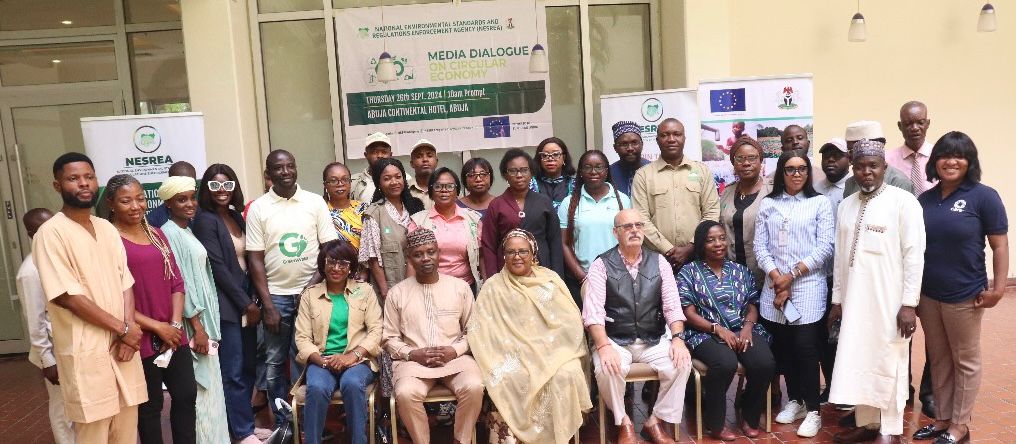
…says Nigeria Generates over 32 million tonnes of solid waste annually
By Favour Ulebor, Abuja
To tackle pollution in the environment and minimize waste, the National Environmental Standards and Regulations Enforcement Agency (NESREA) has adopted the circular economy model.
During his address at a media dialogue organised by NESREA in partnership with the European Union (EU) on Thursday in Abuja, the Director-General, NESREA, Innocent Barikor said the circular economy is a sustainable economy model aimed at reducing waste and the consumption of resources by promoting the reuse, recycling, and refurbishment of products.
Emphasizing on the importance of the transitioning from a linear to a circular economy model, Barikor underscored the alignment of the model with several sustainable development goals.
He said, “Circular Economy is a model which transforms the way we produce, consume and dispose of resources.
“It seeks to keep products, materials, and resources in use for as long as possible, minimising waste and pollution.
” It also synchronises with the eight point Agenda of the President Bola Tinubu Administration, particularly economic growth, job creation, food security and ending poverty,” he said.
The NESREA boss noted that Nigeria had since embraced the circular economy model, with NESREA spearheading the initiative through its Extended Producer Responsibility (EPR) programme.
“The Agency has launched the implementation of circular economy principles nationwide,” he said.
In a Goodwill message, the EU programme Manager Energy, Circular Economy and Climate Change, Godfrey Ogbemudia, underscored the need to create more awareness on the circular economy in Nigeria.
He said, “The EU takes this circular economy very seriously, we can’t continue on with the linear economy any more. We support NESREA on this programme and other regulatory framework.
” We are partnering with NESREA to create awareness on the circular economy.”
Describing Nigeria’s Population and waste generation data, Director, Inspection & Enforcement Department, NESREA, Isa Abdussalam said “Nigeria has a population of over 220 million people and generates over 32 million tonnes of solid waste annually”.
Urging Journalists to be catalyst for change and inform the public on how to generate wealth from wastes, Isa said “Collaboration and collective responsibility are key to achieving the goals of minimizing pollution, promoting recycling and reuse of waste, and contributing to a circular economy in Nigeria.
“Collective efforts will allow us to reinvent everything to make our planet more live-able and sustainable. Hence,
visible and robust policy in tavour of transition towards, sustainable circular industry offers economic opportunities for all, making us less dependent on imported, scarce raw materials and other resources, and contribute to a cleaner and healthier environment for all,” He said.
Also speaking, the Director, Partnership and Education, NESREA, Bintu Mohammed said the Circular Economy model in Nigeria was being implemented under EPR programme.
Mohammed said that the EPR programme is already being implemented in Nigeria in some key sectors which included the food and beverages, battery, used tyres, electrical and electronics.
Disclaimer
Comments expressed here do not reflect the opinions of Vanguard newspapers or any employee thereof.